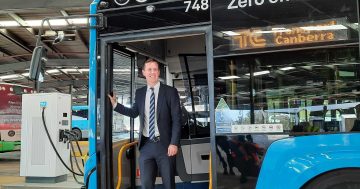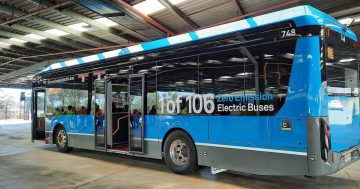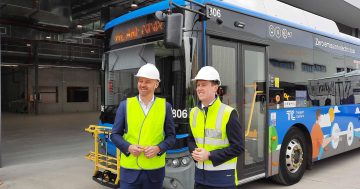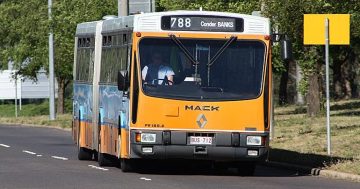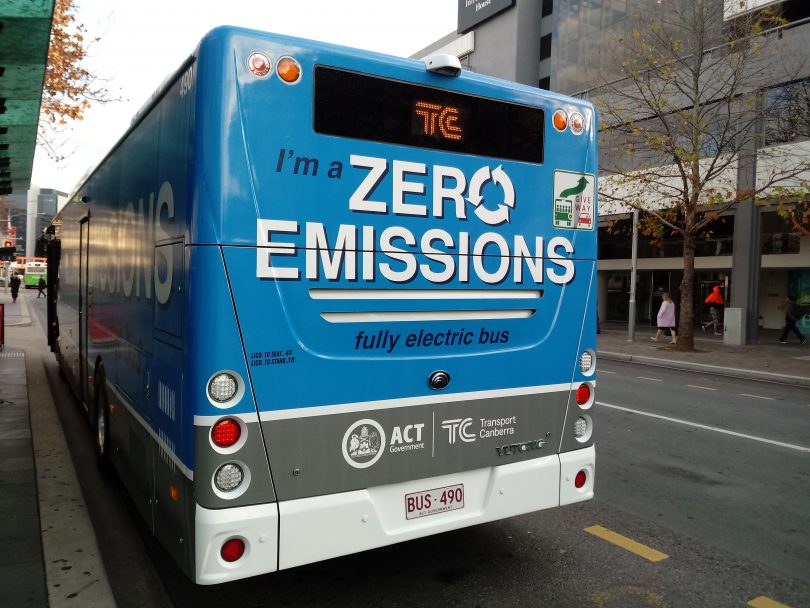
A Chinese-made electric bus which the ACT Government trialled last year. Photo: File.
There has been strong interest from the private sector in providing the first 90 electric buses to the ACT fleet, with more than 100 companies responding so far to the ACT Government’s pre-procurement market sounding.
Minister for Transport and City Services Chris Steel said the more than 100 registrations had come from a wide range of industry sectors, with more expected over the next six weeks before the market sounding concludes at the end of April.
The government has also made public the Industry Project Brief, which sets out its requirements and plans for integrating these first 90 electric buses with the fleet as part of transitioning to a zero-emissions operation by 2040.
A formal procurement process will begin in the third quarter of this year, and will be a separate open market tender process.
Transport Canberra expects the first of these vehicles to arrive in 2021-22 with the final vehicles supplied by no later than 2024.
“The procurement of new battery electric buses has attracted wide interest and gives us confidence of getting the right solution to successfully transition our fleet to zero emissions,” Mr Steel said.
“Industry briefings will include information about our requirements not only to procure the first 90 battery electric buses, but also the associated charging infrastructure and essential training packages required to upskill our workforce to the new technology.”
Mr Steel said the key to this transition would be the delivery of a comprehensive skills and training package for the fleet workforce including bus drivers, transport managers and diesel mechanics.
The Project Brief says about 40 of the new electric buses will be housed and charged at the new Woden Depot in Phillip, which is due to start operations in 2023 and will eventually be home to a fully zero-emissions fleet.
The other 50 buses will be accommodated at locations yet to be specified, although the government is investigating a new depot in the northern suburbs to replace the Belconnen facility, and the Tuggeranong depot will be upgraded to house and support zero-emissions buses.
The buses’ energy capacity, the supply of charging infrastructure and the cost of infrastructure upgrades will be specified in the procurement materials after the inclusion of information from the market sounding.
The Project Brief says the buses will have minimum capacity of 63 passengers, (43 seated and 20 standing), be built to meet disability compliance standards and won’t take cash fares.
They will operate from 5:30 am to 1:30 am and cover an average of 300 kilometres a day.
The Project Brief says Transport Canberra believes that battery electric buses offer the best fit for current operating conditions but has not ruled out hydrogen vehicles in future procurements.
They will help meet the government’s interim climate change target of reducing government-led emissions by 33 per cent by 2025, on the way to a zero-emissions ACT by 2045.
Transport Canberra buses comprise around three per cent of total emissions in the ACT but more than half of all ACT Government emissions.
Transport Canberra will also soon commence the tender process for 34 replacement lower and zero-emission buses so the final orange Renault buses that pre-date emissions standards can be retired from the fleet.
“These buses will be procured via a short-term lease, providing a modern, disability accessible fleet to support Canberra’s bus operations while we build the infrastructure needed to grow our zero-emissions fleet,” Mr Steel said.
The market sounding has involved a wide range of industry representatives and participants including the bus manufacturing, battery technology, energy generation and distribution, skills and service industries.













